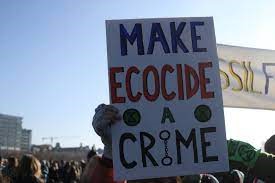
By- Swetha Somu
On March 18, 2021, the French MPs approved to make ‘ecocide’ a serious crime under French law. The draft legislation passed the National Assembly by 44 votes to 10. Under the law, anyone intentionally causing pollution to land, water or soil will be liable for up to 10 years in prison along with a hefty fine of 4.5 million euros.
Extending the chain of events, on 22nd June 2021, the Stop Ecocide foundation had proposed a new definition to ‘ecocide’ in the hopes that it becomes the fifth international crime alongside, genocide, war crimes, crimes against humanity and crimes of aggression, under the jurisdiction of International Criminal Court (‘ICC’).
This article attempts to look at the growing significance of ‘ecocide’ and its current standing in the international legal arena. The author further brings in the ‘rational choice theory’ and ‘deterrence theory’ vis a vis the crime of ‘ecocide’ to suggest how the criminalization of ‘ecocide’ could be effectively implemented.
Ecocide: its history and implication
The term ‘ecocide’ is derived from the Greek words ‘oikos’ which means home (nature/environment) and ‘cide’ which means to kill. Ecocide not only aims to protect nature itself but, most importantly, humans from the adverse consequences of environmental destruction as ingrained in Stockholm Declaration. ‘Ecocide’ was first coined by Professor Arthur W. Galston at the Conference on War and National Responsibility in 1970. Two years later, Swedish PM Olof Palme advocated the criminalisation of ‘ecocide’ at the U.N during the Vietnam War period thereupon marking the start of the journey to give legal significance to intentional environmental destruction.
To illustrate, there are various cases of ecocides which shook the environmentalist and conservationists. One of the most devastating degradations of the environment is the emissions from the tar sands in Alberta, Canada. It’s deemed as one of the most ‘damaging projects’ on the planet as it can emit dangerous substances over 30% more than conventional oil. The infamous case of the burning Amazon rainforest is another classic example of ‘ecocide’. In fact, the rate of deforestation of the Amazon Forest has increased by 88% from 2018 to 2019. This elucidates that ‘ecocide’ is a growing problem that needs to be internationally addressed as, for example, the burning of Amazon, also known as the carbon sink of Earth, has the potential to trigger negative externalities, such as destroying its rich biodiversity and increasing the process of global warming which causes further climate change resulting in the rising sea levels causing concerns in other countries like the Maldives and Vanuatu. Thus, there arises a need for international legal recognition as many countries are grappling in the consequences of environmental damage.
Although few countries like Vietnam, and Russia have already adopted ‘ecocide’ as crimes against peace, many are still yet to have stringent civil laws against less severe violations against the environment. Countries like Thailand and Ethiopia don’t take environmental damage as a serious offence affecting human rights besides the environment hence the need for international criminalisation arises.
India, for example, recognizes the right to clean environment under the fundamental right to life (Article 21). However, last year, the government released a draft Environmental Impact Assessment (‘EIA 2020’) which took a regressive step backwards by allowing ‘ex-post facto clearance’ for ongoing projects. These time-to-time amendments of EIA tend to oscillate from pro-environmentalist to pro-industrialist hence lingering the uncertainty of one’s human rights and one’s liability.
In contrast, the recent case of Milieudefensie et al. v. Royal Dutch Shell plc, under the district court of Hague, became a landmark decision by holding a private corporation accountable for environmental damages in regards to international human rights law as it was affecting the Dutch citizens under Art.2 and 8 of European Convention for the Protection of Human Rights and Fundamental Freedoms and Articles 6 and 17 of the International Covenant on Civil and Political Rights.
The court interestingly interpreted and enforced various international soft laws such as the UN Guiding principles on business’ human rights obligation and UN Global Compact however, the legal enforceability still lacks. Although the significance of soft laws is gaining importance, people like the famous Earth lawyer Polly Higgins, fought, and many are still fighting for a concrete legal framework to hold violators accountable in order to trigger the intended legal protection of environmental and human rights.
‘Ecocide’ must become the fifth international crime
The new definition proposed by Stop Ecocide was: “For the purpose of this Statute, “ecocide” means unlawful or wanton acts committed with knowledge that there is a substantial likelihood of severe and either widespread or long-term damage to the environment being caused by those acts.” Article 8 (2)(b) interprets ‘severe’ is of any damage which causes ‘grave impacts on human life’ thus making it a crime against humanity.
Once ICC recognizes ‘ecocide’ as a crime, it can hold corporations, governments and industries liable thus triggering new changes and practices worldwide. The reason behind this is that environmental violations are majorly being dealt with under civil law; like how the court in Shell judgement above held RDS liable under Torts law. Thus, to alleviate the degree of seriousness of the violations and to shift everyone’s mindset, environmental destruction needs to be recognized as a crime. A crime attracts more punishment and sees more serious enforceability through the courts, unlike civil wrongs. Thus, the increased significance of ‘ecocide’ will provoke positive actions towards safeguarding the environment and human rights.
Moreover, if ICC has the authority to prosecute and intervene in cases of ‘ecocide’ where the state is not doing the bare minimum to investigate and solve the issue , it will definitely induce fear in potential violators to mend their ways in accordance with the law. However, it should be kept in mind that ICC’s authority is only binding on the states which ratified the Rome statute yet it can prosecute anyone, whether citizen or not, within the territory of the signatories. Currently, only 123 countries have ratified it hence, to uphold the true spirit of ecocide (global protection of human rights and environment) it would be ideal to have all countries as signatories of the Rome statute to reap the maximum benefit of the criminalisation of ‘ecocide’. This is because the non-parties to ICC will not fear its authoritative power hence allowing for the violation of human rights within its territory.
So, in order to ensure protection and welfare of people around the world, maximum countries should come into consensus, along with the mindset, to acknowledge and enforce ‘ecocide’ laws as a serious criminal offence and a crime against humanity.
Ecocide through the lens of ‘Rational Choice theory’(‘RCT’) and ‘Deterrence theory’ (‘DT’)
Assuming that most countries have ratified the Rome Statute and have come under the jurisdiction and legal obligation of the ICC, the criminalisation of ‘ecocide’ is still not complete. Crimes like rape and murder are still facing debates on whether the criminal tag is effectively deterring people from committing it. The controversy on whether the death penalty is an effective deterrent for crimes like rape is still being debated by humanitarians, criminologists and lawyers across the world hence this new inclusion of ‘ecocide’ as a crime should be given maximum thought so that the crime effectively deters the mass destruction of environment and infringement of human rights.
While analysing a crime, different established theories are connected and studied in the process of enhancing the purpose of the crime. Thus, when the crime of ‘ecocide’ is being newly established, the implications of RCT and DT should immediately come into picture. The theoretical framework of RCT was widely used in the field of economics and sociology until recently where criminologists started using it to explain the causation of crimes. The theory simply suggests that people assess the legal consequence that follows after the crime is committed by deciding whether the personal benefit outweighs the potential punishment and displeasure.
In the context of ‘ecocide’, the government and private corporations are a major player in the destruction of environment. For example, the Kenyan government has indulged in destroying the ecosystem for their biggest ever railway project and another case is where Shell and other oil and gas companies are polluting the Nigerian Delta. Although the companies promised to restore the damages caused in the Nigerian Delta, the process is lackadaisical due to the absence of stringent punishment.
Under RCT, the criminalisation of ‘ecocide’ should perform two things: reward compliance to law and punish the violation of it. If both aspects become the spirit of ‘ecocide’ crime, the rewarding factor, if it is more beneficial to the violator, will be more rational for the potential violator hence mitigating the negative externalities borne by the environment and maintaining a safe peaceful environment for the habitants. The rewards could be in the form of lower corporate taxes, awards and honours for environment-friendly companies and a simple increase in the goodwill of a company. The latter factor of punishing the violators arises from the DT. This is the junction where DT forms a nexus with RCT.
The doctrine of DT lies in the fact that, according to the principle of utility, people assess the situation to see if the advantage of committing the crime outweighs or even compensates the prescribed punishment. The theory holds that by increasing the cost of committing a crime, people will not indulge in it as it causes more displeasure and less of a benefit for them. Thus, committing the crime of ‘ecocide’ should be able to attract hefty penalties and punishment which, both the government and corporations should fear. Penalties such as ceasing operations, providing injunctions to projects, imposing sanctions on governments should threaten the violators with the guilt of loss and a good reputation.
In sum, the criminalization of ecocide is one step forward to environmental and humanitarian justice however it requires more thought and wisdom in its global implementation. The mere status of crime will not prevent ‘ecocide’ rather the ideology and spirit of the law should focus solely on mitigating environmental damage, thus the RCT and DT are being used to optimize the result of criminalization of ‘ecocide’.
[Swetha Somu is a student of GNLU]

